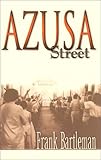 In Azusa Street, Frank Bartleman, gives a detailed account of the beginning of the Pentecostal styled revival that occurred from 1906-1909. He gives significant details on the background events that led up to the revival and then follows the revival as it begins to spread across the United States. A significant key to the effectiveness of this account is the position within the movement of Frank Bartleman himself. He was not just a reporter of the events that took place or a passive bystander, but he was an actual participant and leader of this Pentecostal movement, thus, giving the reader the benefit of both the facts of the events and the personal effects that the revival had on this person’s life and on others that experienced it. It is however important to keep in mind that because of Bartleman’s position within the movement, his critique of the movement may be somewhat skewed.
In Azusa Street, Frank Bartleman, gives a detailed account of the beginning of the Pentecostal styled revival that occurred from 1906-1909. He gives significant details on the background events that led up to the revival and then follows the revival as it begins to spread across the United States. A significant key to the effectiveness of this account is the position within the movement of Frank Bartleman himself. He was not just a reporter of the events that took place or a passive bystander, but he was an actual participant and leader of this Pentecostal movement, thus, giving the reader the benefit of both the facts of the events and the personal effects that the revival had on this person’s life and on others that experienced it. It is however important to keep in mind that because of Bartleman’s position within the movement, his critique of the movement may be somewhat skewed.
The account by Frank Bartleman clearly shows the sacrifices that he and his family made because of his determination to have a deeper and richer relationship with God in his life. This new relationship that he developed not only impacted his own life, but compelled him to share his personal experience with others. The reader can easily visualize from the descriptions given, the trials that Frank Bartleman and his collegues went through, and at the same time, the strength of their faith in God th at grew through each trial they encountered. The willingness of Bartleman and others like him to suffer for their faith should force the Christian today to seriously question their own level of commitment and what it means to live as an authentic Christian in the world today.
The book points out that many of the difficulties that Frank Bartleman and other missionaries of his day encountered were actually attacks that originated from the organized churches of the day. Many evangelists and preachers confronted them as they sought to spread this new experience which they deemed as given from above. But yet, it also revealed that there were many people during Bartleman’s time who were searching for an experiential relationship with God that would go beyond the cerebral and fill an emotional void left by their present religious experience. Many “hungry souls” came there were who were desperately seeking this Pentecostal experience. Bartleman is quick to point out however that many came for selfish reasons. He said that, “Most were seeking selfish blessings. They rushed to meetings, like a big sponge to get more blessing. They needed stepping on.”
According to Bartleman, one of the primary characteristics of the early Pentecostal movement was the overwhelming sense of God’s immediate presence. Accounts like the following are common throughout the work. “Then suddenly, the Lord Jesus revealed Himself to us. He seemed to stand directly between us, so close we could have reached out our hands and touched Him” (17). It is this sense of God’s presence that allows Bartleman and his colleagues to boldly move in a direction of total self-denial that lifted God and community as the central theme around which the movement surged. The community came together and gave themselves completely to the task of “seeking the Lord.” They would saturate themselves in prayer; praying for hours, sometimes days at a time. They saw themselves as nothing, taking seriously Christ’s admonition to seek to be last. This self-denial and abasement left them open to what was, in there estimation, a movement of the Holy Spirit that took them beyond their own reasoning into the realm of the supernatural. This supernatural experience was accompanied by what they interpreted to be the sign gifts of the New Testament, including the most common sign, speaking in tongues. Whatever a person my believe concerning these charismatic gifts, it is obvious that the experiences of the early Pentecostal movement were significant enough to give the followers of the movement the courage to spread the movement in spite of constant opposition.
Any Christian who desires to give their entire life to the Lord Jesus Christ would greatly benefit from reading this book which depicts the trials and tribulations and at the same time, the tremendous blessings that these early Christians of the twentieth century experienced. This book has forced me to reflect on where we as Christians need to be today and ask serious questions regarding my own commitment as I seek to live as an authentic Christian in an often unwelcoming world.